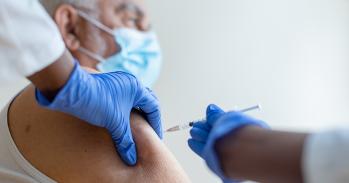
Professor Sharon Peacock leads a Strategic Research Initiative that is harnessing expertise in infectious diseases across the University of Cambridge. Here, to launch our month-long focus on infectious disease research, she explains how the initiative is gearing up to play a major role in global health.
Professor Sharon Peacock leads a Strategic Research Initiative that is harnessing expertise in infectious diseases across the University of Cambridge. Here, to launch our month-long focus on infectious disease research, she explains how the initiative is gearing up to play a major role in global health.
Combating infectious diseases remains as important as ever. A combination of basic and applied research has led to some extraordinary success stories, such as the eradication of smallpox. Yet history tells us that the emergence of a new infectious disease that goes on to threaten the health of the global population is a likely scenario. Furthermore, success may not have in-built longevity. The most important example of this is the discovery of a plethora of antimicrobial drugs, followed by continual erosion of their efficacy through the emergence of resistance.
The research being undertaken at the University demonstrates that infectious disease research represents a priority area in Cambridge. Our strengths are broad and range from fundamental biological research through to the development of new drugs, as well as understanding the history of infectious diseases. The translation of genomic technologies to define and contain the spread of bacterial drug resistance represents an important example of how new technologies can be harnessed to tackle global health problems.
One of the challenges faced by any University is to define mechanisms whereby research efforts can be coordinated to achieve synergies between different departments and areas of expertise. This is being driven in part by the growing trend for major funding organisations to develop funding calls that require interdisciplinary teams of investigators to address ‘big problems’, and infectious diseases research funding is no exception. The Cambridge Infectious Diseases Initiative can help to meet this need, and aims to promote and facilitate all forms of infectious disease research including interdisciplinary efforts, together with the associated training and capacity building.
Over the last two years, Cambridge Infectious Diseases has played a key role in the development of several new initiatives, including a successful bid to become a Wellcome Trust Centre for Global Health Research, and the newly designated WHO Collaborating Centre for Modelling, Evolution and Control of Emerging Infectious Diseases.
It also supports a range of existing initiatives, including the THRiVE programme and Cambridge in Africa, which provide training and mentorship to African scientists – many of whom work in regions where infectious diseases take their highest toll. Cambridge Infectious Diseases promotes networking through its annual one-day infectious diseases meeting, and facilitates new initiatives by helping researchers to organise and hold seminars and workshops on topics of their choice. Engagement and outreach activities are also part of its remit, and include lectures at local schools, a science writing competition, and a new card game based on Top Trumps to be launched during the Cambridge Science Festival 2013.
Find out more
For more information, please visit www.infectiousdisease.cam.ac.uk/, or contacting the Cambridge Infectious Diseases Initiative coordinator, Anna Davies (avd26@medschl.cam.ac.uk). Professor Sharon Peacock is in the Departments of Medicine and Pathology.
This work is licensed under a Creative Commons Licence. If you use this content on your site please link back to this page.





